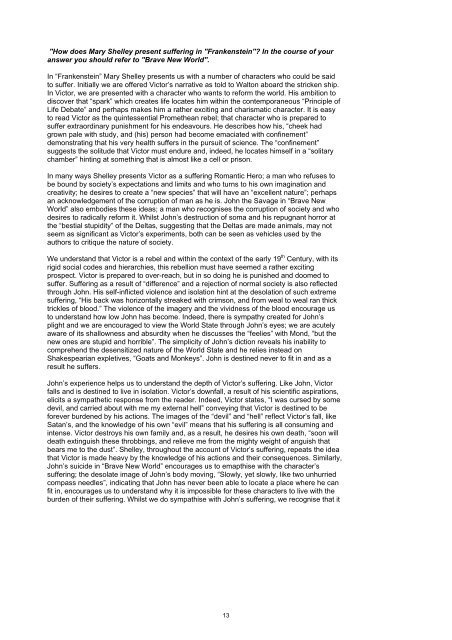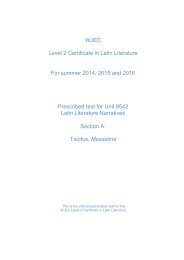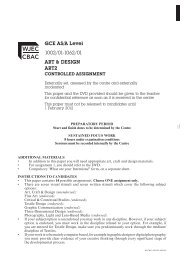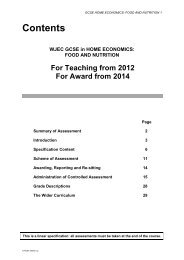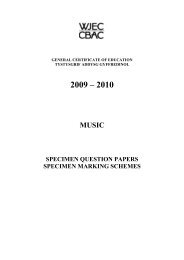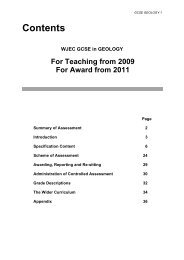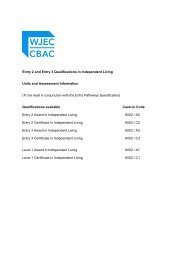WJEC ENGLISH LITERATURE
WJEC ENGLISH LITERATURE
WJEC ENGLISH LITERATURE
You also want an ePaper? Increase the reach of your titles
YUMPU automatically turns print PDFs into web optimized ePapers that Google loves.
"How does Mary Shelley present suffering in "Frankenstein"? In the course of your<br />
answer you should refer to "Brave New World".<br />
In “Frankenstein” Mary Shelley presents us with a number of characters who could be said<br />
to suffer. Initially we are offered Victor’s narrative as told to Walton aboard the stricken ship.<br />
In Victor, we are presented with a character who wants to reform the world. His ambition to<br />
discover that “spark” which creates life locates him within the contemporaneous “Principle of<br />
Life Debate” and perhaps makes him a rather exciting and charismatic character. It is easy<br />
to read Victor as the quintessential Promethean rebel; that character who is prepared to<br />
suffer extraordinary punishment for his endeavours. He describes how his, “cheek had<br />
grown pale with study, and (his) person had become emaciated with confinement”<br />
demonstrating that his very health suffers in the pursuit of science. The “confinement”<br />
suggests the solitude that Victor must endure and, indeed, he locates himself in a “solitary<br />
chamber” hinting at something that is almost like a cell or prison.<br />
In many ways Shelley presents Victor as a suffering Romantic Hero; a man who refuses to<br />
be bound by society’s expectations and limits and who turns to his own imagination and<br />
creativity; he desires to create a “new species” that will have an “excellent nature”; perhaps<br />
an acknowledgement of the corruption of man as he is. John the Savage in “Brave New<br />
World” also embodies these ideas; a man who recognises the corruption of society and who<br />
desires to radically reform it. Whilst John’s destruction of soma and his repugnant horror at<br />
the “bestial stupidity” of the Deltas, suggesting that the Deltas are made animals, may not<br />
seem as significant as Victor’s experiments, both can be seen as vehicles used by the<br />
authors to critique the nature of society.<br />
We understand that Victor is a rebel and within the context of the early 19 th Century, with its<br />
rigid social codes and hierarchies, this rebellion must have seemed a rather exciting<br />
prospect. Victor is prepared to over-reach, but in so doing he is punished and doomed to<br />
suffer. Suffering as a result of “difference” and a rejection of normal society is also reflected<br />
through John. His self-inflicted violence and isolation hint at the desolation of such extreme<br />
suffering, “His back was horizontally streaked with crimson, and from weal to weal ran thick<br />
trickles of blood.” The violence of the imagery and the vividness of the blood encourage us<br />
to understand how low John has become. Indeed, there is sympathy created for John’s<br />
plight and we are encouraged to view the World State through John’s eyes; we are acutely<br />
aware of its shallowness and absurdity when he discusses the “feelies” with Mond, “but the<br />
new ones are stupid and horrible”. The simplicity of John’s diction reveals his inability to<br />
comprehend the desensitized nature of the World State and he relies instead on<br />
Shakespearian expletives, “Goats and Monkeys”. John is destined never to fit in and as a<br />
result he suffers.<br />
John’s experience helps us to understand the depth of Victor’s suffering. Like John, Victor<br />
falls and is destined to live in isolation. Victor’s downfall, a result of his scientific aspirations,<br />
elicits a sympathetic response from the reader. Indeed, Victor states, “I was cursed by some<br />
devil, and carried about with me my external hell” conveying that Victor is destined to be<br />
forever burdened by his actions. The images of the “devil” and “hell” reflect Victor’s fall, like<br />
Satan’s, and the knowledge of his own “evil” means that his suffering is all consuming and<br />
intense. Victor destroys his own family and, as a result, he desires his own death, “soon will<br />
death extinguish these throbbings, and relieve me from the mighty weight of anguish that<br />
bears me to the dust”. Shelley, throughout the account of Victor’s suffering, repeats the idea<br />
that Victor is made heavy by the knowledge of his actions and their consequences. Similarly,<br />
John’s suicide in “Brave New World” encourages us to emapthise with the character’s<br />
suffering; the desolate image of John’s body moving, “Slowly, yet slowly, like two unhurried<br />
compass needles”, indicating that John has never been able to locate a place where he can<br />
fit in, encourages us to understand why it is impossible for these characters to live with the<br />
burden of their suffering. Whilst we do sympathise with John’s suffering, we recognise that it<br />
13


